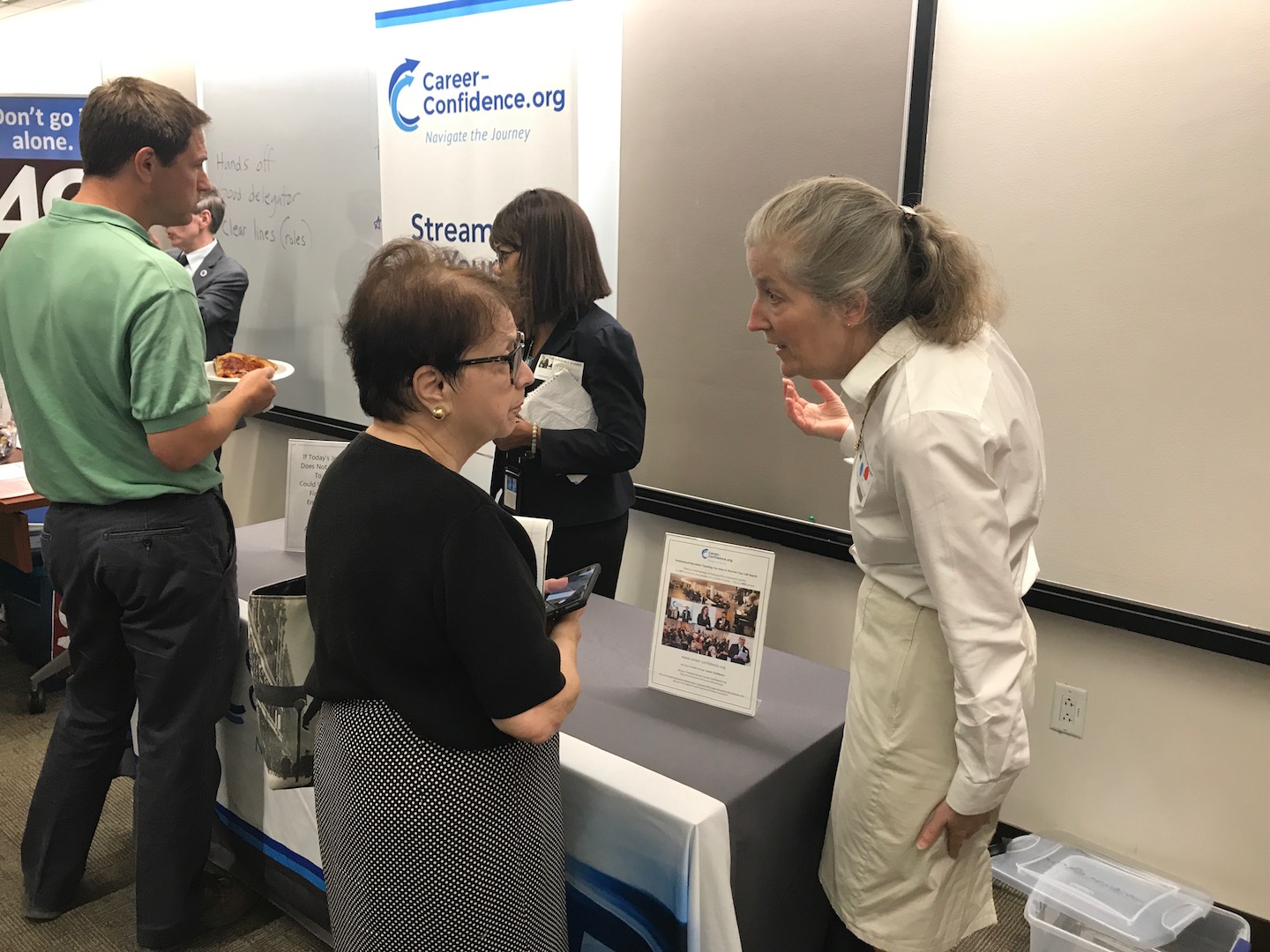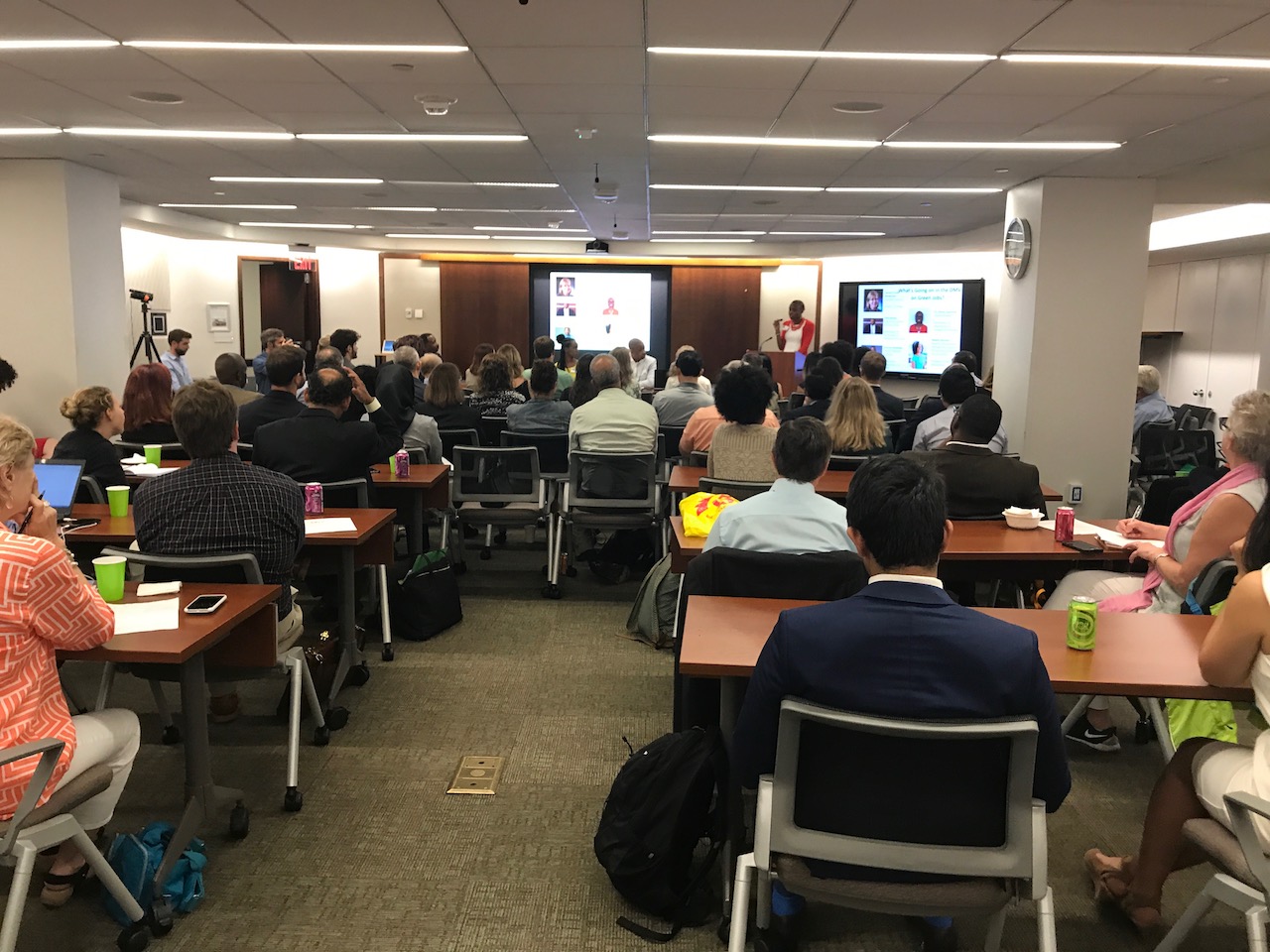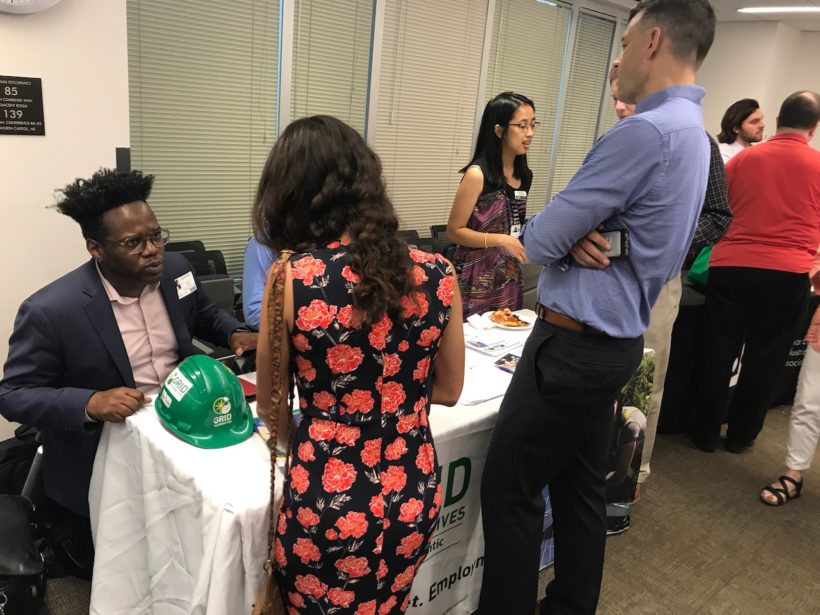 By CAROLINE HEILBRUN
By CAROLINE HEILBRUN
You walked across the stage. You shook the hand of the president, the provost, the dean, and the mascot. Your got your degree framed and hung it with care on your parents’ basement wall.
Now what?
You attend a green jobs fair, such as the 5th Annual Green Jobs Forum hosted by Leaders in Energy on August 16thin Washington, D.C. The nation’s capital and surrounding areas are hotbeds for positions that ultimately serve to combat climate change or protect natural resources. Of course, anyone working in environmental policy would appreciate proximity to federal legislators, but D.C. also boasts a robust network of cleantech companies and sustainable development organizations. What better place for a young green professional to jumpstart their career?
I volunteered at the Green Jobs Forum wearing two hats: event reporter and post-graduate position seeker. I’m a rising senior, so I have some time before I enter the fray, but I learned a great deal about the process of finding and acquiring an entry-level green job. Here, I’ve distilled my insights into a handy guide for a graduating or post-graduate student, from English major to engineer, who wants to work in the “green space.”
Why go to a green jobs fair?
I met many recent graduates from institutions such as Virginia Polytechnic University, the University of Delaware, George Washington University, and Imperial College London. Everyone I interviewed agreed that the Green Jobs Forum was, above all, a congregation of people with the same goal of mitigating climate change and its effects. Therefore, it served as a better place to find like-minded superiors and coworkers.
Andrew Eames, a 2014 graduate of the University of Mary Washington and a Grid Alternatives SolarCorps fellow, attended a green jobs forum to find his first post-graduate position with a nonprofit. Eames said, “I felt like I wanted to have a job with meaning…I’ve always been attracted to [that] type of impact.”

What can I do while still enrolled in university to improve my chances of finding a green job?
Work hard, keep your GPA up, and try to envision the bigger picture as you complete your coursework. How will crystallizing these scientific findings into a digestible and interesting report help me in a career? Will performing these mock economic analyses translate into the real world? How can I apply my entrepreneurship skills in life?
There are also more concrete actions you can take. You can start building your network by joining organizations such as Leaders in Energy, which also has a lively LinkedIn group, especially if you are certain that you want to live and work in D.C. upon graduation. If you know of any professors in the environmental engineering or sciences department, reach out to them for advice or an informational interview. You can also get a head start on energy certifications while in college. For $200, you can enroll in a 4-hour LEED Green Associate (GA) training workshop. Upon completion, you take a 2-hour exam at a nearby Prometric center, and just like that, you’re a certified green buildings expert. Likewise, the Association of Energy Engineers (AEE) is making their certifications more accessible to students with the Energy Manager in Training (EMIT) designation. The EMIT is a fast track to the Certified Energy Manager (CEM) designation, which opens abundant opportunities in the energy sector, according to exhibitor Irwin Kim of AEE’s National Capital Chapter. With a CEM certification, you’ll be considered by “energy management facilities, manufacturers, vendors, utilities, really anyone concerned with how energy is consumed in buildings.”
Finally, be proactive. While you’re still in your junior or senior year, you can explore your school’s job portals and see which organizations offer on-campus recruiting. Oftentimes, you can filter your search results by checking “Environment,” “Energy,” or “Sustainable Development” under the Industry options menu. You can also explore outside job portals, including USAJobs for government jobs (and respective state portals, as green policies might move faster at the state level), Solar Energy Industry Association (SEIA)’s job portal, and even generic job search portals like Monster, Glassdoor, and Indeed.
Many post-graduate positions in the green space are unfunded volunteer opportunities. If you want to build microgrids in Eritrea and fight energy poverty without pay, make sure that you supplement your dream experience with a funded fellowship. Apply early and often for sources of money, because you may only receive a partial award.
The green space is so broad. What if I want to help the planet, but don’t have a specific area of interest?
Ah, yes, the jack of all trades, master of none. My pursuit of an Environmental Studies degree, for instance, has provided an excellent overview of atmospheric and oceanic climate science, energy and environmental policy, economics, and technology. Many budding environmentalists don’t know where to focus their passions.
For example, if you’re really excited about solar energy’s potential but don’t know where to start, the Solar Energy Industries Association (SEIA) publishes a job portal featuring all of their coalition members, from panel manufacturers to law firms litigating for solar-enabling policies. These portals can give a job seeker a “top-down” view of the field, allowing you to see the myriad different skills needed to support the growth of solar energy.
Andie Wyatt, GridAlternatives’ Policy and Regulatory Manager, addressed the fear of beginning a green career as a ‘generalist’ during the Green Jobs Success Stories panel. She reassured the audience that she started out as “a generalist to an absurd degree” as an attorney, and the path from ‘general’ to ‘specific’ is actually the most common to take. Over the years, Ms. Wyatt gained valuable experience with a law firm honing her legal skill set and later briefing Congressmen about environmental issues. She transitioned to a job requiring very specific knowledge about green technologies, but her extensive policy background is allowing her to conquer the learning curve.
However, one employer in the audience warned the ‘generalists’ to still tailor every cover letter and resume iteration to the specific requirements of the job.

What sector is best to start out in? Nonprofit, private, public, or government?
In general, the sector doesn’t matter as much as 1) following your passion and 2) honing your skill set. However, for an entry-level position, the latter takes on greater importance.
Ms. Wyatt urged recent graduates to gain experience in the public and private sectors before applying to work at a “dream nonprofit.” Non-governmental organizations may have limited funds, and would prefer to hire people with multiple years of experience who can make immediate contributions. Positions in the public and private sectors allow young professionals to build a solid foundation of verbal and quantitative skills that will be valuable in the future.
What can I do in the interim while searching for a job?
Spencer Schecht, another Green Jobs Success Stories panelist, holds two green jobs: one for SEPA and another for Green Drinks D.C. Schecht recommends that a job seeker “always be busy.” You should not idle or put your life on hold while you search for a job. More is more—ask for informational interviews from prospective coworkers or industry professionals on a weekly basis. Don’t be afraid to cold-email connections you find on LinkedIn. Mr. Schecht estimates about 20% of complete strangers will be flattered enough to accept your offer to meet or speak on the phone if you demonstrate your interest effectively.
Besides networking, you can also use your spare time to read whitepapers or publications in your field. Greentech Media, Energy and Environment News, or personalized Google Alerts are great outlets. This way, you can not only stay up to date with current events, but perhaps even discover your dream employer. The name of every person quoted in an article or referenced in a research paper is published alongside their organization, so do some exploring.
One of the most worthwhile ways to be ‘busy’ is to volunteer. Oftentimes, your volunteer experience can build character and skills directly transferable to your green job. For instance, if you volunteer with Habitat for Humanity, you might learn about energy-efficient construction. Canvassing for a political candidate might teach you about the hot-button environmental issues in your region and sharpen your persuasion skills. Of course, there is no ‘wrong’ way to give back to your community, so just like seeking a job, follow your passion when volunteering.
Caroline Heilbrun is a senior Environmental and Energy Studies major at Yale University. Professionally, Caroline is interested in the transformation of the electric utility industry, market-based mechanisms and investments to lower clean energy costs, and storage paired with renewables for a more resilient and reliable power grid.Caroline is a member of Yale University’s solar installation club, Students for Carbon Dividends, and the varsity swim team.



Leave a Reply